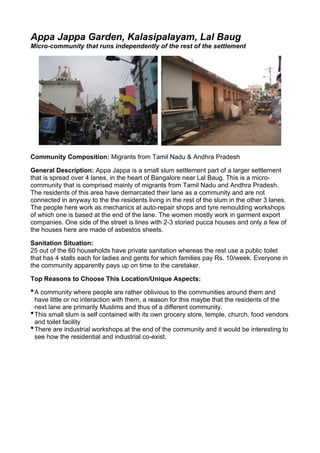Appa Jappa Garden_Lal Baug_Bangalore
- 1. Appa Jappa Garden, Kalasipalayam, Lal Baug Micro-community that runs independently of the rest of the settlement Community Composition: Migrants from Tamil Nadu & Andhra Pradesh General Description: Appa Jappa is a small slum settlement part of a larger settlement that is spread over 4 lanes, in the heart of Bangalore near Lal Baug. This is a micro- community that is comprised mainly of migrants from Tamil Nadu and Andhra Pradesh. The residents of this area have demarcated their lane as a community and are not connected in anyway to the the residents living in the rest of the slum in the other 3 lanes. The people here work as mechanics at auto-repair shops and tyre remoulding workshops of which one is based at the end of the lane. The women mostly work in garment export companies. One side of the street is lines with 2-3 storied pucca houses and only a few of the houses here are made of asbestos sheets. Sanitation Situation: 25 out of the 60 households have private sanitation whereas the rest use a public toilet that has 4 stalls each for ladies and gents for which families pay Rs. 10/week. Everyone in the community apparently pays up on time to the caretaker. Top Reasons to Choose This Location/Unique Aspects: ŌŚÅA community where people are rather oblivious to the communities around them and have little or no interaction with them, a reason for this maybe that the residents of the next lane are primarily Muslims and thus of a different community. ŌŚÅ This small slum is self contained with its own grocery store, temple, church, food vendors and toilet facility ŌŚÅ There are industrial workshops at the end of the community and it would be interesting to see how the residential and industrial co-exist.

